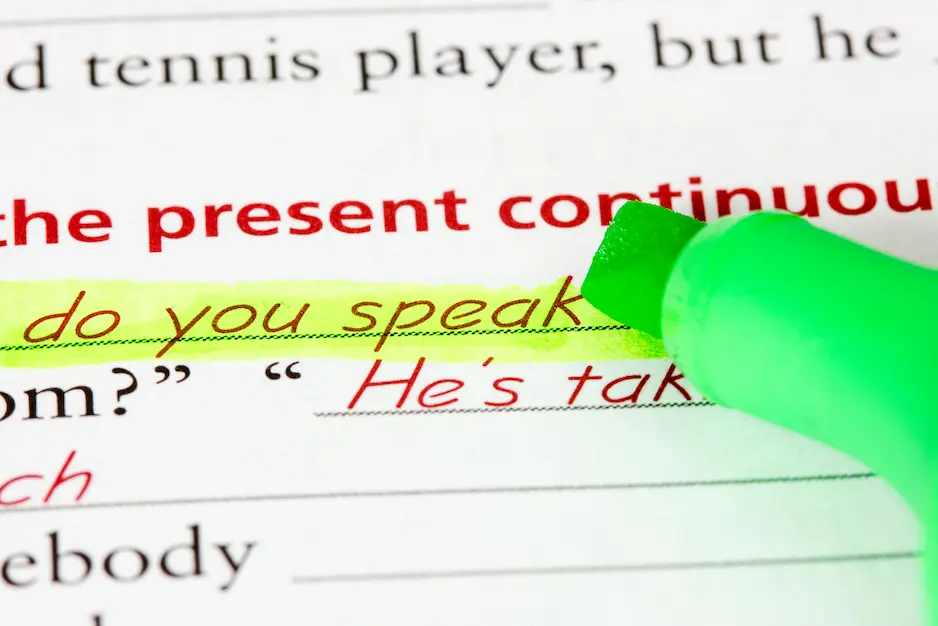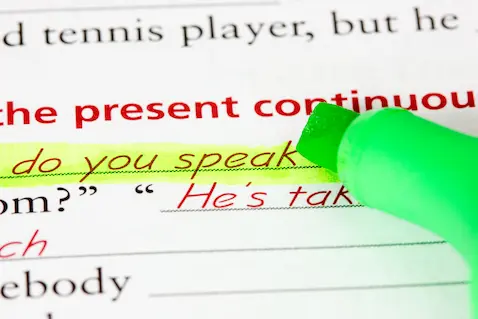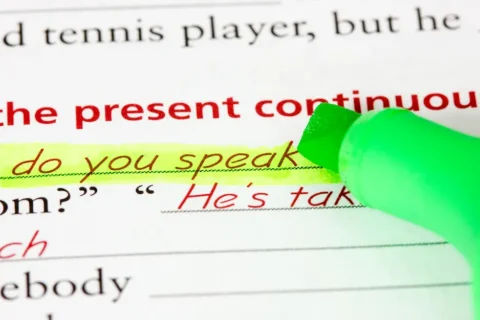Should students focus on grammar? Should they focus on communication? Or should it be something in between?
This question comes up repeatedly in ESL classrooms, especially from adult learners who have experienced very different approaches in the past. Some have spent years memorising rules but still struggle to speak. Others have attended highly communicative classes but feel their language lacks accuracy and control.
So, is grammar really important?
The short answer is yes. But the more important question is: how should grammar be taught?
Why the “grammar vs communication” debate misses the point
The debate is often framed as a choice between two extremes.
On one side, there are grammar-heavy courses. Lessons revolve around structures, terminology, and controlled exercises. Students may develop strong rule awareness, yet hesitate when asked to express something spontaneously.
On the other side, there are purely communicative approaches. Students talk, read, and discuss topics – but with little structured attention to form. Fluency may improve, but gaps in accuracy often persist.
Most learners don’t thrive at either extreme. Grammar and communication are not opposites. They are interdependent.
(If you’re interested in the wider debate around acquisition and conscious learning, see our guide to language acquisition vs language learning.)
Why grammar alone doesn’t create fluent speakers
It’s common to meet learners who can explain the present perfect, list conditional forms, or define parts of speech, yet struggle in real-time conversation.
Knowing about grammar is not the same as being able to use it.
When grammar is taught in isolation from meaning and context, learners often try to “assemble” sentences rule by rule. This slows communication and increases anxiety. Instead of expressing ideas, they mentally search through grammatical categories.
Accuracy matters, but language is not built through conscious rule recall alone.
Another issue is cognitive overload. When students are asked to think about rules, exceptions, forms and terminology at the same time as trying to express meaning, something has to give. Usually, it’s fluency.
Grammar awareness is helpful. But grammar-first thinking rarely produces confident speakers.
Why conversation alone isn’t enough either
At the same time, simply encouraging learners to “just speak” has its limitations.
Exposure and interaction are essential, but without moments of clarification and pattern awareness, learners may:
- Repeat inaccurate forms
- Fossilise persistent errors
- Struggle to expand beyond familiar structures
Advanced learners may benefit from conversation-focused classes because they already have a structural foundation. But beginners and intermediate learners usually need more support than conversation alone can provide.
Fluency without structure can plateau just as easily as structure without fluency.
Students often feel fluent in conversation-heavy classes, until they encounter more demanding situations, such as formal writing, exams, or professional communication. That’s when the gaps become visible.
What learners often expect
It’s also worth acknowledging that many learners expect grammar.
For some, “learning” means receiving rules. If a lesson feels too open-ended or discussion-based, they may feel they are not progressing.
Part of a teacher’s role is managing this expectation – showing learners that grammar is being addressed, but in a way that supports real use rather than replacing it.
Transparency helps. Explaining why you are approaching grammar in context can increase student confidence and reduce resistance.
What grammar is really for
Grammar is not an end in itself. It’s a system that helps learners:
- Organise meaning
- Express time, relationships, and nuance
- Expand their range
- Increase clarity
- Refine accuracy
Most native speakers cannot formally describe all the grammar they use, yet they use it effectively. This tells us something important: the goal is not to produce linguists. It’s to produce confident language users. Grammar serves communication. It should support it, not replace it.
There is also an important difference between knowing a rule and noticing how language works.
A learner may be able to explain a structure clearly, yet fail to recognise it when listening or reading. Conversely, a learner may repeatedly encounter a pattern in meaningful context and gradually begin to use it accurately, even if they cannot formally describe it.
Effective grammar teaching often sits between these two. It draws attention to patterns at the moment they become meaningful, helping learners notice how language is working in real situations.
When explanation reinforces something learners have already seen and understood in context, it strengthens awareness rather than interrupting communication. That is when grammar begins to support long-term development instead of slowing it down.
A practical model for teaching grammar in context
So how do we bring grammar and communication together in a balanced way? A practical classroom sequence might look like this:
1. Start with meaning
Introduce a topic, situation, or communicative task. Activate curiosity. Allow learners to predict, respond, or engage naturally. For example, before teaching the present continuous, you might begin with a story or an image and ask: “What’s happening in the photo?”
2. Provide rich exposure
Offer input in context – a short text, dialogue, listening extract, or scenario. Focus first on overall understanding, not form. Let students understand the situation before analysing how it is expressed.
3. Narrow the focus
Once learners understand the message, guide them to notice useful patterns or structures within the material. This stage is about awareness.
4. Clarify briefly and clearly
Now introduce focused explanation. Keep terminology minimal unless it genuinely helps. The aim is to clarify how the structure works, not to overwhelm learners with labels.
5. Controlled practice (when useful)
Drills and structured exercises can help consolidate new forms. Used properly, they reinforce patterns and build confidence. They should support communication, not replace it. A few targeted exercises can prevent repeated mistakes later.
6. Communicative use
Return to meaningful use. Role plays, discussions, problem-solving tasks, or personalised questions allow learners to apply the structure for real purposes.
7. Recycle and revisit
New grammar doesn’t become automatic after one lesson. It needs to reappear in future contexts. Recycling builds long-term retention and gradually shifts knowledge from conscious awareness to automatic use.
Common mistakes in grammar teaching
Some of the most common problems arise when:
- Grammar is introduced without context
- Terminology dominates explanation
- Practice is disconnected from real use
- Errors are corrected constantly during fluency activities
- Structures are “covered” once and never revisited
Effective grammar teaching is less about volume and more about timing, clarity, and recycling.
Creating language users, not linguists
As teachers, our goal is not to train students to recite grammatical terminology. It’s to help them function in the language.
That means:
- Balancing clarity with communication
- Providing structure without rigidity
- Encouraging experimentation
- Allowing space for errors
- Supporting gradual accuracy development
Some learners enjoy grammatical analysis. Others find it intimidating. A flexible approach allows room for both, without letting grammar dominate the lesson.
Bringing grammar and communication together
The most effective ESL classrooms rarely choose one side of the debate. They:
- Begin with meaning
- Highlight form when useful
- Provide structured practice
- Return to communicative application
Grammar works best when it emerges from communication and feeds back into it. When taught in context and revisited over time, grammar strengthens fluency rather than restricting it. And that is ultimately the goal.
Final thoughts
Is grammar important? Yes, but not as a checklist of rules to memorise.
Grammar matters because it enables learners to express meaning more clearly, more precisely, and more confidently. The key lies not in whether we teach grammar, but in how we integrate it into a communicative framework.
Used thoughtfully, grammar becomes a tool, not a barrier.








